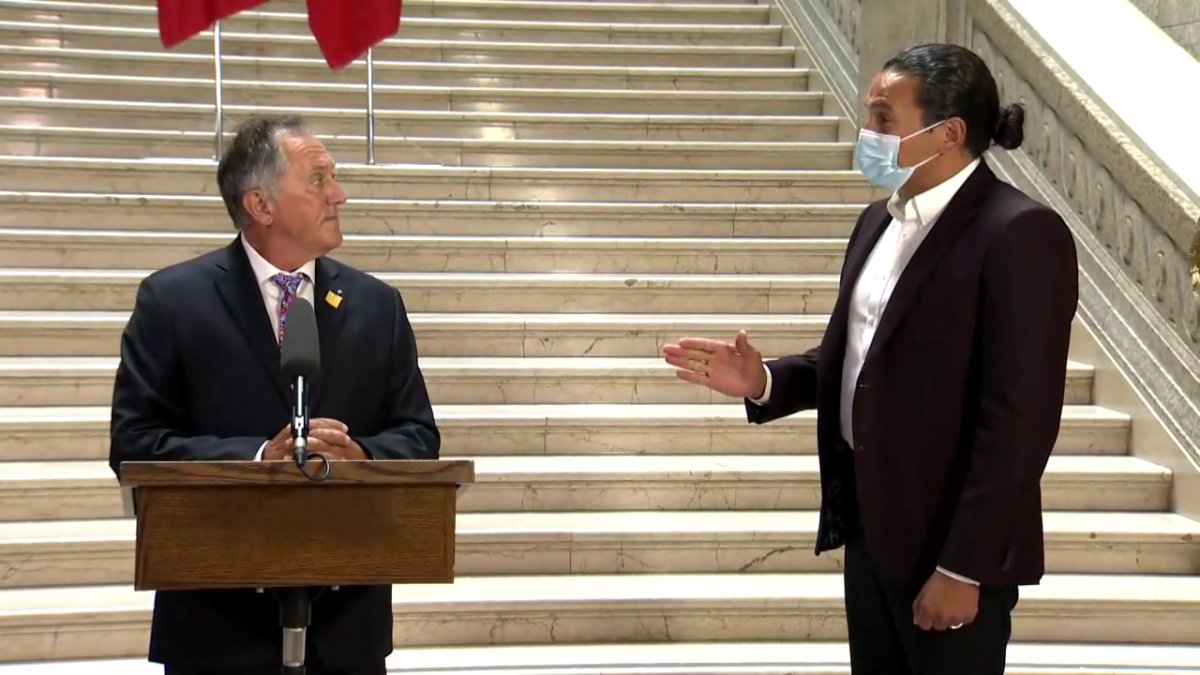Manitoba’s new minister for Indigenous relations has issued an apology as the government continues to deal with the fallout from Premier Brian Pallister’s remarks on Canadian history.

In a prepared statement, Alan Lagimodiere says he sincerely apologizes for his words and asks for forgiveness.
On Thursday, minutes after he was sworn into cabinet, Lagimodiere defended some of the intentions behind residential schools and said they were originally aimed at teaching skills to Indigenous children.
He was challenged by Opposition NDP Leader Wab Kinew, who said the truth about residential schools is that they were designed to kill the Indian in the child.

Lagimodiere later took back his remarks and said residential schools were wrong and designed to eradicate Indigenous culture.
Lagimodiere has now issued a full apology in which he clearly states regret.
“Today, I would like to offer my sincerest apologies to all Indigenous and non-Indigenous Manitobans, and Canadians whom I have offended greatly with my remarks yesterday,” Lagimodiere’s statement on Friday read.
“I want to acknowledge the words I used to respond to a question about residential schools, during my first scrum as a new minister in this very important portfolio, were wrong, and I genuinely and sincerely ask for your forgiveness.”

Get breaking National news
The statement was the latest development in a controversy that has dogged the Progressive Conservative government for more than a week.
It started when Pallister criticized protesters who had toppled statues of Queen Elizabeth and Queen Victoria on the legislature grounds.

Pallister said people who came to Canada, both before and after it was a country, came not to destroy anything but to build communities, churches and businesses.
His comments were criticized by Indigenous leaders as minimizing the harmful effects of colonialism.
Two days later, Indigenous and Northern Relations Minister Eileen Clarke quit her cabinet post. She said many Manitobans are disappointed with their representatives, and added that she and other cabinet ministers had not been listened to.
Lagimodiere, who is Metis, was elevated from the backbenches to replace Clarke with a renamed portfolio — minister of Indigenous reconciliation and northern affairs.
Some government caucus members have come out to make clear their stance on residential schools.
“I want nothing more than for my grandson and all Indigenous people to live in a country brave enough to accept the awful truth of what happened, and to commit to doing better,” Families Minister Rochelle Squires said in a prepared statement.
“Therefore I am deeply troubled by recent events and comments.”
Squires rejected an interview request and did not specify which events and comments she was referring to.
Progressive Conservative backbencher Shannon Martin took to social media.
“So there is no confusion, residential schools — the name is designed to minimize their legacy, let’s call them what they were, re-education camps — (were) designed not to benefit Indigenous peoples, but to erase their cultures & in too many instances, their lives,” Martin wrote on Twitter.


Comments
Want to discuss? Please read our Commenting Policy first.